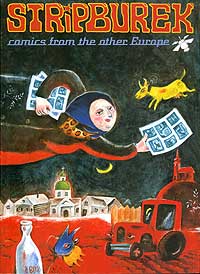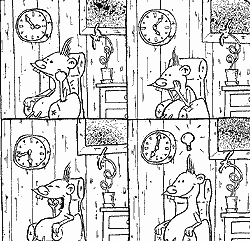
|
Were Top Shelf to fold we might never again see the likes of such special works as "Stripburek: Comics from the Other Europe," (Stripburger; 216pp.; $17.95) a collection of Eastern European comix imported by Top Shelf. Produced by the same group that did a strange and wonderful box of mini-comix last year (see TIME.comix review), "Stripburek" is a more straightforward collection of over fifty black and white works translated into English. Comix from Albania, Bosnia and Herzegovina, Bulgaria, Croatia, the Czech Republic, Estonia, Hungary, Macedonia, Poland, Romania, Slovenia, the Ukraine and Yugoslavia are all here.
Reading "Stripburek" gives the impression that the Iron Curtain resulted in a kind of comix Galapagos where the avant-garde, poetical and parable possibilities of comix evolved in unexploited splendor. Danijel Zezelj's "Petrified Tree" uses high-contrast, slashing brushwork to interpret a poem by Pier Paolo Pasolini. Lucie Markvartova's "Switch On-Off" builds a story out of all the buttons a finger must push throughout the day. Many pieces are like Wostok and Grabowski's fantastical "Daddy Where Are You," about a little girl who follows Daddy's beard through all manner of obstacles only to find him as a TV image. Either through edgy graphics or strange, dreamy story lines, nearly all the pieces defy conventional, Western comix storytelling and styles.
 Ivan Mitrevski's little guy gets an idea in "Stripburek"
Ivan Mitrevski's little guy gets an idea in "Stripburek" |
There's also a sense of history that rarely appears in American comix. Jacek Fras mixes collage with silly cartoon characters in a story that takes place during the Polish resistance against the Nazis. Jurcan & Cvek's "Condemned Ideas" examines the failure of ideologies from Fascism to Communism to Capitalism. But the most unifying trait turns out to be a kind of dark, absurdist sensibility. In Goran Feniks' "A Weird Story," a man takes care of some paperwork while plummeting to his death from an airplane explosion. There's ample amounts of satire and schadenfruede, but little humor of the joyful, delightful kind.
Graphically and narratively many of the pieces in "Stripburek" will be a challenge for even the most experienced and patient of American comix readers. Ultimately it's a good thing and I'd hate to be denied it. Happily, within twelve hours of Top Shelf's plea comix fans had rallied to the cause, saving the publisher from demise. The consequences for other publishers remain to be seen.
"Stripburek" can be found at superior comic shops or purchased directly from Top Shelf's website.
